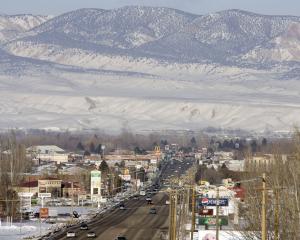WASHINGTON (AP) — The government
has failed to inspect thousands of oil and gas wells it considers
potentially high risks for water contamination and other environmental
damage, congressional investigators say.
The report,
obtained by The Associated Press before its public release, highlights
substantial gaps in oversight by the agency that manages oil and gas
development on federal and Indian lands.
Investigators
said weak control by the Interior Department's Bureau of Land
Management resulted from policies based on outdated science and from
incomplete monitoring data.
The
findings from the Government Accountability Office come amid an energy
boom in the country and the increasing use of hydraulic fracturing, or
fracking. That process involves pumping huge volumes of water, sand and
chemicals underground to split open rocks to allow oil and gas to flow.
It has produced major economic benefits, but also raised fears that the
chemicals could spread to water supplies.
The audit also said the BLM did not coordinate effectively with state regulators in New Mexico, North Dakota, Oklahoma and Utah.
The
bureau has become a symbol of federal overreach to industry groups
opposed to government regulations related to oil and gas drilling.
Environmental groups say the Obama administration needs to do more to
guard against environmental damage.
In the coming months, the administration is expected to issue rules on fracking and methane gas emissions.The report said the agency "cannot accurately and efficiently identify whether federal and Indian resources are properly protected or that federal and Indian resources are at risk of being extracted without agency approval."
In response to the report, Tommy Beaudreau, a principal deputy assistant interior secretary, wrote that he generally agreed with the recommendations for improved state coordination and updated regulations.
The
report makes clear in many instances that the BLM's failure to inspect
high-priority oil and gas wells is due to limited money and staff. BLM
officials said they were in the process of updating several of its
policies later this year.
Investigators
reviewed 14 states in full or part: Arkansas, California, Colorado,
Louisiana, New Mexico, North Dakota, Ohio, Oklahoma, Pennsylvania, South
Dakota, Texas, Utah, West Virginia and Wyoming. In Ohio, Pennsylvania
and elsewhere, fracking has become increasingly prevalent.
The
report said the BLM had failed to conduct inspections on more than 2,100
of the 3,702 wells that it had specified as "high priority" and drilled
from 2009 through 2012. The agency considers a well "high priority"
based on a greater need to protect against possible water contamination
and other environmental safety issues.The agency had yet to indicate whether another 1,784 wells were high priority or not.
The BLM has developed agreements with some states, which also have jurisdiction over well inspections on federal lands. According to the GAO, it had reached agreements with regulators in California, Colorado, Nevada and Wyoming.
The report
said BLM has not reviewed or updated many of its oil and gas rules to
reflect technological advances, as required by a 2011 executive order.
They include guidance on spacing of wells, which the report said could
help maximize oil and gas production.
The
bureau acknowledged it had not updated its guidance on oil and gas
drainage since 1999 or its guidance on mineral trespass — interference
of drilling or mining activity — since 2003.
Congressional
investigators found the BLM did not monitor inspection activities at
its state and field offices and thus could not provide "reasonable
assurance" that those offices were completing the required inspections.
In
Pennsylvania, for instance, an Associated Press investigation found the
state received 398 complaints in 2013 alleging that oil or natural gas
drilling polluted or otherwise affected private water wells. More than
100 cases of pollution were confirmed over the past five years.
"This
report reaffirms our concern that the government needs to pay attention
to the environment and protect public health and drinking sources from
the risks of oil and gas development," said Amy Mall of the Natural
Resources Defense Council.
But
Kathleen Sgamma, vice president of government and public affairs at the
Western Energy Alliance, a trade group representing energy companies,
said the report's findings show that states are better positioned to
regulate oil and gas drilling.
___
Follow Hope Yen on Twitter: http://twitter.com/hopeyen1

No comments:
Post a Comment